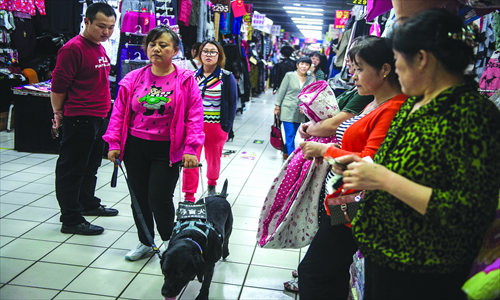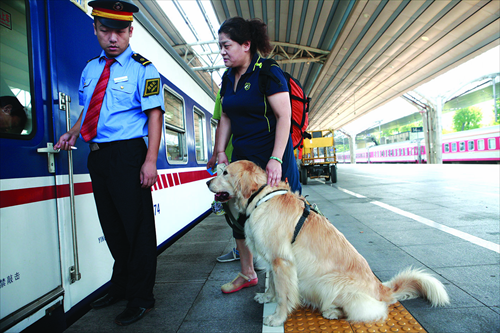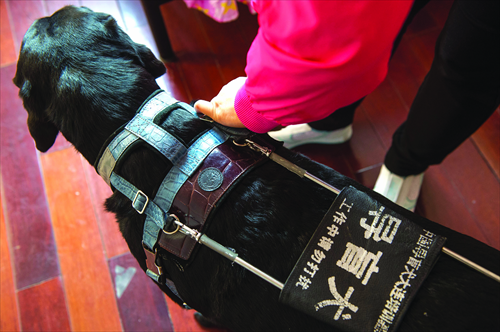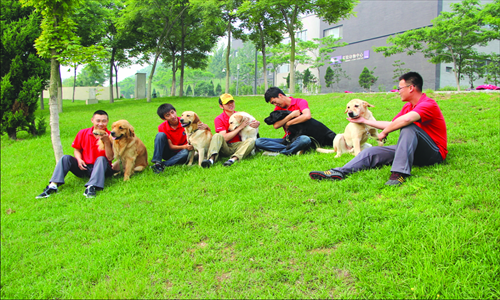Blindsided by society

Jennifer, a Labrador guide dog, helps her blind master Chen Yan choose dog food at a Changping district mall. Photo: Li Hao/GT
Beijing will join the rest of the world in honoring the achievements of the blind and visually impaired on White Cane Safety Day on October 15, although the day also presents an opportunity to acknowledge the contributions made by the city's handful of guide dogs.
Beijing is home to more than 67,000 blind people, but just eight guide dogs. On a national scale the figures aren't much better, with about 50 guide dogs for the country's 17.31 million blind or visually impaired people, according to 2013 figures from the China Blind People's Association.
Guide dogs were introduced to China in 2006, although their expensive cost of training coupled with routine discrimination over where they can and cannot go in public have kept their potential on a short leash.
New leash on life
Jennifer is one of Beijing's eight guide dogs. The 5-year-old black Labrador is owned by Chen Yan, China's first blind female piano tuner. Chen and her husband, who is also blind, live with Jennifer in a quiet residential compound in Tiantongyuan, Changping district.
During a recent trip to the supermarket, Jennifer showed her playful side by enthusiastically leading Chen directly to the pet food aisle.
"Jennifer, is this what you want?" Chen, holding a packet of dried dog food, asked her faithful canine.
Jennifer's response was to continue standing, indicating "no," prompting Chen to go through small and medium packets. Eventually, Chen reached for a large packet. Jennifer showed her approval by sitting.
"Jennifer is like my child, she is so helpful. She takes me to the park, supermarket and mall. Depending on sidewalk Braille tiles, which often lead into parked cars, is awful by comparison. Jennifer knows how to tell the female restroom from the male one. Even I can't figure that out," laughed Chen.
Jennifer has come a long way from her puppy days spent at the China Guide Dog Training Center (CGDTC) in Dalian, Liaoning Province.
The center is the only Chinese mainland non-profit organization that trains and provides guide dogs to the blind for free.
Wang Yan, director of administration at the CGDTC, said it usually takes two years of training worth 120,000 yuan ($19,608) before a guide dog can serve its blind master.
Before Chen, 40, adopted Jennifer, she had a hired assistant to help her with daily tasks. Even though Jennifer has helped Chen lead a more fulfilling life by assisting her in daily tasks and providing greater independence, the duo frequently faces discrimination by being denied entry to various public places and aboard public transportation. However, most of the time they are denied due to misunderstanding rather than malice.
Left in the doghouse
Metropolitan joined Chen and Jennifer on a trip to a mall nearby their home last week to witness a typical day for the pair. Even though Chen couldn't see fellow shoppers' stares, she clearly heard their comments.
"Did you hear that child ask why a dog is allowed into the mall?" Chen sighed. "My hearing is extra sensitive because I'm blind. I was really angry yesterday when I encountered a similar situation. I reacted by scolding the child. Today I restrained myself."
Chen has been a fighter all her life. Born blind because of congenital cataracts, she was raised by her grandmother after her parents abandoned her. In Jennifer she has found a companion acutely aware of the rejection Chen feels at being shunned in public. Staff at Tiantongyuan Subway Station have refused the duo entry 12 times.
During the 2008 Beijing Olympics and Paralympics, temporary regulations were drafted that permitted guide dogs on public transportation. In August 2012, a national regulation came into effect that stipulated guide dogs be permitted entry to all public places.
However, Chen notes this regulation is routinely flaunted in Beijing and other Chinese cities she visits where she and Jennifer have been refused entry to parks, tourist sites, hotels and aboard buses.
Jennifer has become so accustomed to being rejected at the subway that she now tries to steer Chen away when she approaches it. The pair subsequently relies on the few taxis with drivers considerate enough to take them where they want to go.

Bystanders stare at Chen Yan and Jennifer at a Changping district mall. Photo: Li Hao/GT

Ping Yali and Lucky attempt to board a train. Photo: Li Hao/GT

Jennifer is fitted with her guide dog harness. Photo: Li Hao/GT
Low public awareness
Ping Yali, China's debut Paralympic gold medalist, became the first owner of a guide dog in Beijing when she adopted Lucky in 2006. Two years later, the golden retriever was at Ping's side as she ran in the Paralympic torch relay.
Even though she owns one of Beijing's eight guide dogs, she seldom takes the 10-year-old canine outdoors anymore because of the trouble they face.
"I have no choice. I can't fight with people daily, so now most of the time I leave Lucky at home if I can't arrange for a car to take him. We just spend nights together," sighed Ping, who triumphed in long jump at the 1984 New York Paralympics.
Heading outdoors with Lucky entails more than just fitting the dog with his guide harness.
Ping must also carry many certificates, including Lucky's guide dog license and health certificate, to convince others the pair should be permitted entrance to public places.
Even if the real world can be inhospitable at times to Jennifer, she has at least been warmly received by the online world. The Labrador has her own Sina Weibo account with more than 60,000 followers. She even inspired a book authored by Chen that is told from the dog's perspective titled Mother, I'm Your Eyes (2012).
"There is still low public awareness about guide dogs. People try to touch and even feed guide dogs when they see them in public," said Chen.
Wang noted that China only uses Labradors and golden retrievers as guide dogs, even though overseas other breeds are also trained.
"We don't train German shepherds and giant poodles out of consideration for Chinese people, many of whom are intimidated by their appearance," said Wang.

Instructors and their dogs take a break from training at the China Guide Dog Training Center (CGDTC) in Dalian, Liaoning Province. Photo: Courtesy of the CGDTC
Envisioning a better future
Dalian's municipal government has helped fund the CGDTC since 2010, reimbursing the center with 60,000 yuan each time a guide dog graduates. Donations also come from the public and companies, although Wang said the CGDTC's funding is "far from enough" to satisfy the needs of around 400 blind people on the national guide dog waiting list.
Asked of the center's goal over the next five years, Wang said it was to "catch up to international standards" in training guide dogs.
"Currently, the training center is outdoors. We want to build one indoors and have a sheltered one outdoors, which could cost more than 10 million yuan, so that dogs can be trained year-round," said Wang.
The center is currently training more than 60 dogs, although of these only 20 are expected to graduate and be assigned to blind owners. The ones that aren't qualified will be returned to foster families.